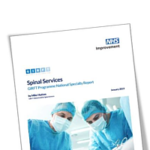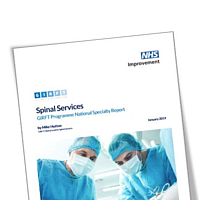 Since the NHS Long Term Plan (LTP) was published on 7 January 2019, the Universal Personalised Care: Implementing the Comprehensive Model has been published.
Since the NHS Long Term Plan (LTP) was published on 7 January 2019, the Universal Personalised Care: Implementing the Comprehensive Model has been published.
The document defines personalised care: people have choice and control over the way their care is planned and delivered based on ‘what matters’ to them and their individual strengths, needs and preferences.
There are six components to the model:
- Shared decision making
- Personalised care and support planning
- Enabling choice, including legal rights to choice
- Social prescribing and community-based support
- Supported self-management
- Personal health budgets and integrated personal budgets.
Read more of this article



 ARMA has welcomed the inclusion of references to MSK in the NHS Long Term Plan. The real challenge is how to implement this in the local NHS plans. ARMA has set out the “
ARMA has welcomed the inclusion of references to MSK in the NHS Long Term Plan. The real challenge is how to implement this in the local NHS plans. ARMA has set out the “
 by Leyla Hannbeck, Director of Pharmacy at NPA
by Leyla Hannbeck, Director of Pharmacy at NPA


 Public Health England added a musculoskeletal chapter to its All Our Health guidance to help health professionals prevent ill health and promote wellbeing in their everyday practice.
Public Health England added a musculoskeletal chapter to its All Our Health guidance to help health professionals prevent ill health and promote wellbeing in their everyday practice.
 Comments are invited on any aspect of the document including its relevance and applicability to the chiropractic profession, the achievability of the standards described in the quality statements, the utility of the quality statements in terms of promoting best care, the document’s accuracy and validity in terms of the evidence base and the clarity of the content to practitioners, patients and other stakeholders.…
Comments are invited on any aspect of the document including its relevance and applicability to the chiropractic profession, the achievability of the standards described in the quality statements, the utility of the quality statements in terms of promoting best care, the document’s accuracy and validity in terms of the evidence base and the clarity of the content to practitioners, patients and other stakeholders.… 
 s I sat down to write this, NHS Chief Executive Simon Stevens was on the radio talking about plans to increase the ability of patients to see pharmacists and physios rather than a GP as their first point of contact in the NHS. Ensuring we have the right workforce to meet the growing health needs of an ageing population is a real challenge. ARMA’s different professional members have a lot to contribute, as I discovered when I spent a day at the Royal College of Chiropractors conference.…
s I sat down to write this, NHS Chief Executive Simon Stevens was on the radio talking about plans to increase the ability of patients to see pharmacists and physios rather than a GP as their first point of contact in the NHS. Ensuring we have the right workforce to meet the growing health needs of an ageing population is a real challenge. ARMA’s different professional members have a lot to contribute, as I discovered when I spent a day at the Royal College of Chiropractors conference.… 
 The National Institute for Health and Care Excellence is inviting comments on the consultation of a new version of the principles that guide the development of NICE guidance and standards. The consultation will run until 11 February 2019.
The National Institute for Health and Care Excellence is inviting comments on the consultation of a new version of the principles that guide the development of NICE guidance and standards. The consultation will run until 11 February 2019.
 by Sarah Duncan, Head of Clinical Policy, NHS England
by Sarah Duncan, Head of Clinical Policy, NHS England